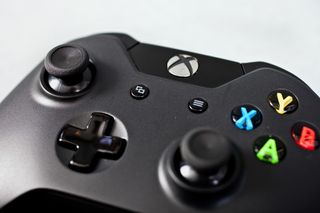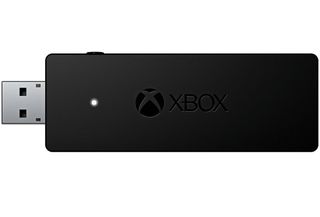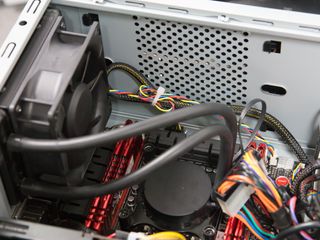Is PC Gaming Really Worth the Hassle?
Performing even the simplest PC gaming repairs can be an enormous pain, but the rewards are (mostly) worth it.
Last week, I wrote a piece about console vs. PC gaming in which I came down, very gently, on the side of PCs. While they can be expensive to build, I argued that their huge game libraries and broad range of nongaming applications make up for any shortcomings.
Well, almost any shortcomings.
In my article, I pointed out that my biggest gripe with PC gaming was having to act as your own tech support. This is partially true if you bought your PC from a big manufacturer like Asus or Alienware; it's especially true if you built a machine from scratch. A recent experience reminded me of just how hair-pullingly frustrating it can be to effect the simplest PC gaming repairs — and how the rewards are still (mostly) worth it.

Control(ler) freak
Connecting a controller to a console is simplicity itself. Just turn on the console, turn on the controller, and they're linked, right out of the box. If there's a problem, you can often just press a button to sync them, or attach them directly with a USB cable to reinstate the connection.
Would that it were so easy on a PC. I've been playing a lot of The Witcher 3: The Wild Hunt (side note: Play The Witcher 3, if you haven't already; it's probably the best PC RPG since Baldur's Gate). But the wire on my old Xbox 360 controller kept wrapping around my arms and thighs. Newer Xbox One controllers can connect to PCs via either Bluetooth or a specialized adapter. I built my PC before Bluetooth was a thing, so the adapter it was.
(You can also simply connect Xbox One controllers with a USB cable, but if I did that, I'd be right back to square one with a wired controller.)
If you've never used the Xbox One Wireless Adapter on a PC, let me tell you: It's a thing of beauty. I'd used it at work many times, and installing it could not be simpler. You just plug it into an open USB port, let Windows automatically install the drivers, then press a button to sync your Xbox controller. I assumed I would take it out of the box and be playing The Witcher 3 within 5 minutes.
Four days later, I took my first tentative steps back into Geralt of Rivia's bloodstained boots.
One of the simplest PC gaming accessories wound up causing a catastrophic cascade failure, and the fix was something I never would have imagined — nor would a tech support representative, if I even had access to such a person.

The problem
I popped the wireless adapter out of the box and into the first open USB drive in my computer. The sync light didn't light up, which I thought was unusual, because it's supposed to take only about 30 seconds for installation to complete.
Like all great computer users who came before me, I figured the most expeditious solution would be to unplug the gizmo, restart the computer and plug it in again. I did so, to no effect. Clearly, this was going to take longer than I thought.
I decided it was time to roll up my sleeves and deal with the drivers directly. After opening Device Manager, I was sure I'd identified the problem. My computer recognized the adapter, but there was an ugly yellow sign with an exclamation point inside of it. The driver had failed to install correctly.
I'd already spent about 10 more minutes than I'd wanted to spend installing the adapter, but at least my odyssey was nearly at an end. I uninstalled the driver completely, unplugged the adapter, restarted my computer and plugged it back in. The sync light did not illuminate. The dreaded yellow exclamation sign appeared once again.
From here, I decided that Reddit, Tom's Hardware, NeoGAF or a similar site would hold the answer. However, after scouring the web for hours, I was no closer to finding an answer. While other people had problems connecting Xbox controllers wirelessly, those people tended to have very prosaic solutions (update the firmware), the wrong operating system (the adapter is optimized for Windows 10, which I have) or completely different issues with similar search terms (Xbox 360 controllers or Bluetooth connections).
A handful of people seemed to have my exact problem. No one had ever replied to their threads.

The tech-support conundrum
At this point, I certainly could have contacted Microsoft and explained the problem to people there. A quick glance at the Microsoft forums convinced me that this would not be a good idea. Other people had attempted this procedure and gotten what is known in technical terms as "the runaround." Additionally, Microsoft's tech supporttends to be lackluster even at the best of times.
Microsoft told callers that they'd have to contact the Xbox division, because the adapter was technically an Xbox product. That division informed callers that they'd have to call general Microsoft support, because the adapter is a PC accessory. The absolute best-case scenario was that Microsoft would offer to replace the adapter, assuming it was a defective device — and yet I knew this wasn't the case, after borrowing two other adapters from work and getting the same results.
There comes a certain point in every PC gamer's life when he or she just knows, in his or her bones, that the problem has exceeded the capabilities of the average customer-support technician. Like the beleaguered hero at the end of a '90s action film, I knew this was something I would have to handle alone.
Luckily, Windows users always have access to the nuclear option: wiping the hard drive and reinstalling everything from scratch. I assumed that some other driver or piece of software I'd installed somewhere along the way must be interfering with the adapter installation. After backing up my files, I arranged to work from home for a day in order to wipe my OS and install a squeaky-clean version. With no drivers or software to get in the way, the adapter was sure to work.
The adapter did not work.
Hours later, after Windows 10 was up and running once again, I plugged in the adapter. A fully patched version of Windows 10 with absolutely no extraneous software tried to install the driver — and failed.

A partial solution
I was nearing my wit's end. Short of returning the adapter (which had been a birthday gift from my girlfriend — not the kind of thing you want to give back) and wrapping myself in the Xbox 360 controller wire, I had no idea what to do. In a fit of desperation, I went back on Google to see if there was a tech forum I had not yet consulted.
Hours later, I found something I hadn't considered before on a forum that I'd never heard of. (Even now, I can't remember what site it was; I visited so many during that hellish week.) A frustrated user had been having problems similar to mine, and a helpful tech expert replied, asking him if his USB ports were up to date.
I had never thought about this before. I knew that my USB ports had the correct software; otherwise, they wouldn't work in Windows. But did they have the proper firmware? Somewhere, in the deepest recesses of my memory, I remembered that improper voltage can cause unexplained hardware errors, and that USB voltage was regulated by a computer's BIOS.
My BIOS hadn't been updated … well, ever. Was it possible that my inexplicable error was the result of nothing more than an electrical issue?
I first found out exactly which hardware manufacturer and BIOS version I had (this is both incredibly important and incredibly difficult — even a slight mistake can brick your entire computer). Then I downloaded the latest version of the firmware onto a flash drive, rebooted my machine into the BIOS and crossed my fingers.
The update didn't work — and as BIOSes are extremely simple pieces of software, there was no indication as to why. On a whim, I decided that perhaps my BIOS was so old that I couldn't simply jump from the oldest version to the newest. I rebooted my computer, downloaded every interim version of the BIOS — all 13 of them — and tried again.
I let loose a barbaric yawp as the little yellow sign disappeared from my Device Manager. My controller worked, at long last. I booted up The Witcher 3 (after waiting a good eight hours for Steam to re-download and install it), and jumped into my first quest.
It was only then that I noticed the trigger buttons didn't function.

The unexpected virtue of self-reliance
Thankfully, this time the driver issue was really just a driver issue. By default, Windows 10 installs the wrong driver for the Xbox One controller. (Don't ask me why; I promise I am just as confused as you are.) After I uninstalled that driver and chose a slightly different one from the Windows repository, the controller was at last firing on all cylinders.
I'd done it. I'd overcome the most difficult tech challenge I'd ever faced as a PC gamer, and I could finally reap my rewards: Playing The Witcher 3 with an Xbox controller.
Which, I reflected bitterly, I'd been able to do earlier that week with only the mild inconvenience of a wire.
In my "PC vs. Console Gaming" article, I pointed out that all PC gamers will eventually encounter a situation like this, regardless of how careful or clever they consider themselves. It's possible that hardcore overclockers are reading this piece in peals of laughter, imagining how dull a person must be in order to work with a seven-year-old BIOS. However, the PC is either the best system for the masses, or it's a rarefied machine accessible only to a privileged few. You can't have it both ways.
I don't consider myself particularly tech-savvy, but I don't think every PC gamer would have been able to solve this problem (clearly not, if the abandoned forum threads are any indication). The satisfaction I felt in solving the problem was genuine, but every part of my investigation and repair process took time. Over the course of four days, I must have poured more than 20 hours into fixing the issue. If I had spent that time playing The Witcher 3 instead, I could have finished one of its excellent expansions.
Winston Churchill once said that "democracy is the worst form of government, except for all those other forms that have been tried from time to time." I feel the same way about PC gaming. It's a messy, convoluted, expensive process with an often-hostile community and an unparalleled potential for disaster.
And yet, I can now play The Witcher 3 (which cost me $25 during a sale) with better resolution and textures than any console can offer, without tripping over a wire every time I stand up. I could think of worse endings to this story.
Sign up to get the BEST of Tom’s Guide direct to your inbox.
Upgrade your life with a daily dose of the biggest tech news, lifestyle hacks and our curated analysis. Be the first to know about cutting-edge gadgets and the hottest deals.
Marshall Honorof is a senior editor for Tom's Guide, overseeing the site's coverage of gaming hardware and software. He comes from a science writing background, having studied paleomammalogy, biological anthropology, and the history of science and technology. After hours, you can find him practicing taekwondo or doing deep dives on classic sci-fi.

